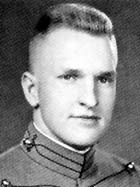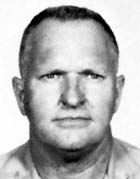From a contemporary press report:
Robert Morehead Cook, 80, an Army colonel who served in three wars and who retired in 1975 as an inspector general at the Pentagon, died of congestive heart failure December 29, 1999 at Mount Vernon Hospital, Virginia.
Colonel Cook, a native of Oxford, Mississippi, lived in Falls Church for 26 years before moving to the Marriott Lifecare Community of Fairfax in 1989.
A January 1943 graduate of the U.S. Military Academy at West Point, he served in the 4th Armored Division during World War II and was seriously wounded while leading a tank attack in the Battle of the Bulge. After a hospital stay in England, he returned to Germany to join U.S. troops in Germany.
He commanded an infantry battalion in Korea during the Korean War and served as an inspector general during a tour in Vietnam during the war there. Between those two wars, he was assigned to the Central Army Group near Heidelberg, Germany.
His military decorations included the Legion of Merit, three Bronze Stars and two Purple Hearts.
He was past chairman of the resident council of the Marriott Lifecare Community and a member of military associations.
Survivors include his wife of 52 years, Ruth Cook of Fairfax.
Courtesy of His Classmates
United States Military Academy Class Of 1943
Robert Morehead Cook
No. 13300 • 12 January 1919 – 29 December 1999
Died in Fort Belvoir, Virginia
Interment: Arlington National Cemetery, Arlington, Virginia
TO COUNTRY, he was Colonel Robert Cook, Infantry veteran of three wars and recipient of Distinguished Service Medal, Silver Star, Legion of Merit, two Purple Hearts, three Bronze Stars, Joint Service Commendation Medal, two Army Commendation Medals, several Vietnamese medals, and numerous service ribbons.
To fellow soldiers, he was “Cookie” — a dedicated and disciplined leader for 33 active duty years and 14 retirement years.
During days before early graduation became “official,” most class members expounded on what they wanted to do after graduation. Cookie said only, “All I want is to be a good officer.” That tells something special about Cookie. A top-notch officer he was!
An unusual and complimentary element of Cookie’s career was the length of his tours: three years in wartime Europe (1944–47), five years at the Infantry School (1948–53), four years with the 3rd Infantry Division (1953–57), five years in USAREUR (1958–63), and twelve years as an Inspector General (IG) (1963–75) including five continuous years in Vietnam! Then he retired and served eight years (1990–98) as Chairman of the Resident Council at a military retirement community.
Born in Oxford, Mississippi, Cookie was youngest of nine children. After two years at the University of Mississippi he was accepted by both Annapolis and West Point; he chose West Point. There he was a student of diversified interests —
cadet sergeant, qualified marksman, base fiddle “slapper” in cadet dance orchestra, and four years participant in Hundredth Night Shows.
Although commissioned in the Infantry, he first attended Tank Destroyer School and joined the 812 TD Battalion. Volunteering for combat in 1944, Cook was sent to Europe as a replacement, ending up in Lorraine as a platoon leader in the 4th Armored Division’s 37th Tank Battalion, where he and Creighton Abrams were the only two West Pointers. That was the unit he had served with during summer training his Cow year, and his association with General Abrams continued in years after.
Driving eastward with Patton’s Third Army, the 4th Armored Division suddenly was shifted north to counterattack the German offensive into the Ardennes. In the lead tank of an armor-infantry task force, Cookie was severely wounded. Ignoring wounds, he turned over responsibilities to subordinates and insisted no one be diverted from the attack for his assistance. While making his way rearward on foot, he was captured by German paratroopers who provided emergency first aid. In the confusion of battle, Cookie escaped and returned to friendly lines and evacuation to a hospital in France. For service as a platoon leader in battle, he garnered a Silver Star and two Purple Hearts.
Following recovery from wounds in England and teaching classes at Sandhurst, he served with the Office of Military Government US (OMGUS) for two years (1945–47) – first in Berlin and then in Sonthofen’s Constabulary. In Berlin he met and proposed to Ruth Irene Hiller, a member of the 1940 German Olympic Team and a world record holder in speed skating. Later in 1947, he and Ruth were married in Michigan — dressed in ski clothes, having skied cross-country to the ceremony.
Leaving occupation duty, it was again school time. First he went to the University of Michigan for a master’s degree in automotive engineering in 1948 and then to the Advanced Course at Fort Benning, first as a student, then as an instructor, during 1948–53.
Once again, time came for war, and Cookie joined the 3rd Infantry Division in Korea. He earned a Bronze Star and, later, still with the division on its return to CONUS, commanded a battalion, making it four years in the division (1953–57).
In 1958, Cookie completed CGSC and returned to Germany for five years, first in USAREUR Headquarters and then as Commander, CENTAG Support Command — a unique organization of French, German, and American troops. With the Berlin crisis behind him, he came home to begin 12 years as an Inspector General (IG). His first IG duties were with the Department of the Army, 1963–67, handling sensitive problems worldwide; then in Vietnam, 1967–72, involved in even more sensitive cases as IG for his former WWII battalion commander, General Creighton Abrams (COMUSMACV); and finally returning to the DAIG, 1972–75. After retiring from the Army, he served in the Department of Energy, initiating and organizing an IG system during 1975–77.
Following this second retirement, Cookie did not rest on his well-deserved laurels. He and Ruth contributed to local volunteer activities and particularly to the 4th Armored Division Association. In 1989, Cookie and Ruth moved to Fort Belvoir, Virginia, into the just-opened Fairfax, an initial Marriott Life Care Retirement Community for Uniformed Services. Cook was the first elected Chairman of the Residents Council and served for eight years, 1990–98. In many ways, his
problems in this forerunner-community were as controversial and as people-sensitive as those he faced earlier as an Inspector General. During that period, sadly, tragedy befell the Cooks, as Ruth was severely injured and invalided in an automobile accident in November 1998.
Cookie is survived by his wife of 52 years, now in nursing care at The Fairfax, and by numerous nephews and nieces. One, Harriet Green, has been especially close to the Cook family over many years.
Well done, Cookie. We are confident you are serving others in Fiddlers Greene with the same dedication and competence that you served your country on earth. You have exemplified in your career our motto, “Duty, Honor, Country.” Ruth and your many admirers say, “Auf Wiedersehen und Gott schuëtze dich!”
COOK, ROBERT M.
On Wednesday, December 29, 1999, at Mount Vernon Hospital, formerly Chairman of Residents Council at the Fairfax Retirement Community and Colonel, U.S. Army. Veteran of World War II, Korea and Vietnam. Survived by wife, Ruth Hiller Cook. On Thursday, January 6, viewing from 2 p.m. until service 4 p.m. at DEMAINE FUNERAL HOME, Alexandria, VA. Interment, Arlington National Cemetery, at a later date. In lieu of flowers, the family suggests donations to the World War II Memorial Fund.
COOK, ROBERT MOREHEAD
COL US ARMY
WORLD WAR II, KOREA, VIETNAM
- DATE OF BIRTH: 01/12/1919
- DATE OF DEATH: 12/29/1999
- BURIED AT: SECTION 59 SITE 2803-1
ARLINGTON NATIONAL CEMETERY
Michael Robert Patterson was born in Arlington and is the son of a former officer of the US Army. So it was no wonder that sooner or later his interests drew him to American history and especially to American military history. Many of his articles can be found on renowned portals like the New York Times, Washingtonpost or Wikipedia.
Reviewed by: Michael Howard


